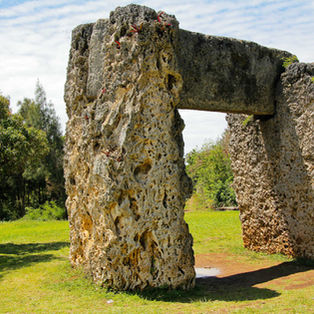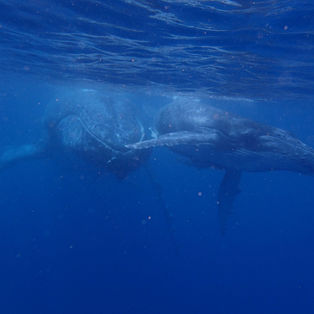
TONGA
If you have the desire to go to the South Pacific and get a taste of 'real' island life without mass tourism, then Tonga might just be that place.

The Kingdom of Tonga is over 1000 years old. Don't just go to the beaches. Learn about the people and their proud history.

All About Tonga
Tonga is laid back, quiet and friendly. Villages sit by the clear emerald waters of the pacific, pigs wander down the street and taro grows under the shade of coconut groves. On Sunday, everything closes and the sound of church bells is as rhythmic as the sea.
For the traveller, there are palm-fringed white sandy beaches, desert islands and mammoth marine life. Most activities here are done on or in the water, diving, sailing, kite surfing, snorkelling coral reefs or relaxing on the white sands. It is also one of the few places in the world you can swim with whales.
Onshore, Tonga offers a taste of the Polynesian pacific as Tongans seamlessly blend their cultural traditions with modern life. Many people live in small villages but even in the capital the roosters might keep you awake at night. You will also see Tongans, especially at church services, wearing their traditional clothing 'ta'ovala'.
It's almost impossible to go to Tonga and not 'meet the locals'. They are invariably friendly, laid back and not on the hustle for tourism. So if you're looking for the 'real' island experience without the tourist hype, put Tonga at the top of your travel wish list.
HISTORY & CULTURE
The monarchy and Christianity are dominating influences in Tongan life or 'anga fakatonga'.
Tonga is Oceania's only remaining kingdom. Although it was a British Protectorate from 1900-1970 it did not lose its indigenous governance, ensuring a continuous feudal line of over 1000 years. Testament to this longevity is the ancient royal cultural sites of Ha'amoga 'A Maui and Mu'a. Today the country remains a Constitutional Monarchy, however, since 2010 Tonga has had its parliamentarians democratically elected rather than appointed by the monarch.
Missionaries first arrived in Tonga in the 1800s and, today, 99% of the population are Christian, predominately Wesleyan. Sundays are sacred and all businesses (resorts excepted) are closed as the population heads to church. Services in Tonga are well known for their a Cappella singing and the resplendent traditional clothing worn by churchgoers, some of the hand-woven Ta'ovala has been handed down through generations.
Like most other Christian islands in the pacific, conservative dress is the norm with knees and shoulders covered and tourists are expected to only show off their swimsuits at the resort beaches.
ENVIRONMENT
The South Pacific archipelago has over 170 islands with only 40 inhabited. Stretching 800km, Tonga has 3 main island groups: Vava'u, Ha'apai and Tongatapu, where the capital Nuku'alofa is located.
The majority of the population engages in subsistence farming. The Ha'apai group of islands is the first of Tonga's island groups to 'go organic' and there is an effort underway for the other islands to follow. This could mean that Tonga is in line to be one of the world's first organic nations.
Many households rely on diesel to fuel electricity and pump clean water. Through a range of renewable, sustainable energy sources including solar, the Tongan Energy Road Map (TERM) aims to reduce diesel importation to 50% by 2020.
SUSTAINABLE TOURISM
Compared to other South Pacific nations, tourism in Tonga is fairly underdeveloped. This makes it one of the more OTBT island destinations in the region. But that doesn't mean there aren't things to do or ways to get there. In fact, travelling in Tonga is as simple and laid back as the rest of the nation's lifestyle. While there are a few local tours there are also plenty of DIY options. Without too much of a tourist track, it's easy to go off it. Jump on the local bus, rent a cycle, hire a taxi or charter boat and make your own itinerary.
Sustainable tourism isn't only about the infrastructure or environment, but also in acknowledging and respecting local culture. Tongans are quick to stress that although they are an island nation they have more to offer than beaches and visitors should take time to get to know the aspects of Tongan culture and history that are important to Tongans. This isn't hard to do. Tonga has been known as the "friendly islands' since early European explorers passed through and they are still more than tolerant to visitors. English is not the first language but it is widely spoken, making conversation easy for English-speaking travellers if your Tongan isn't up to speed. Having said that, Tongan is a Polynesian language with some similarities shared with other Polynesian languages including Maori, Samoan and Hawaiian.
WHEN TO GO
Tonga is a year-round destination. Cyclone season (Nov-April) sees more rain and the possibility of cyclones across the South Pacific. The peak tourism season is from mid-July to mid-October when Humpback Whales are in Tongan waters with their young calves.
It's an amazing experience to get up close and personal with some of Earth's largest mammals and Tonga is one of the few places in the world you can do that. Swims are conducted in small guided groups and time in the water is strictly limited. You can observe and photograph the whales but not touch or approach them. You must have a reasonable level of fitness and swimming ability because, despite the relative calmness provided by the islands and reefs, you will be in the deep waters of the open ocean.
Vava'u and Ha'aapai are the two main locations where Whale swimming activities are conducted. Vava'u has significantly more tourist infrastructure, and consequently more tourists. That has led to reviews of overcrowding on the waters and less satisfying whale encounters for both humans and whales. Ha'apai has only 2 or 3 operators taking a handful of people, giving the whales and people a better experience. Tonga's limited tourist capacity is a good thing for the whales but means flights, accommodation and boats fill up early. Book well in advance.
GETTING THERE & AROUND
Tonga's capital Nuku'alofa on the island of Tongatapu has international flight connections to New Zealand, Australia and Fiji, while cruise ships cruise into the Vava'u island group. Regular flights (RealTonga) and ferries (FISA) connect Nuku'alofa with the outer island groups of Vava'u, Ha'apai and 'Eua.
From Tongatapu airport you can take a taxi or shuttle bus to the city (best arranged in advance through your accommodation). Getting around in downtown Nuku'alofa and it's wharf area is easy enough on foot. To get further out around Tongatapu you will need to hire a cycle, taxi or take the extremely sedate local bus. Remember, generally transport doesn't run on Sundays.






.jpg)







